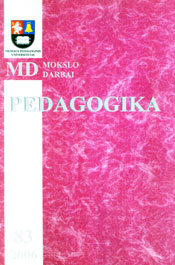Studijų universitete kokybės vertinimo aspektai: studentų požiūrio tyrimas
Studying at University Quality's Estimation's Aspects: Survey of Students' Opinion
Author(s): Daiva SirtautienėSubject(s): Education
Published by: Vytauto Didžiojo Universitetas
Summary/Abstract: The article discusses the results of a students’ survey, which was carried out in order to find out their attitude to the quality of study program realization. With reference to the results analysis respondent conception of study quality is highlighted, characteristics of its estimation are examined, students’ noted factors of qualitative study process are surveyed. The article also analyses the links between students’ needs and the study program. The hinge of primal internal estimation of quality of the studies as an educational process is considered to be the interaction between lecturers and students, involving many aspects: the content of particular program’s courses, the ways and methods of imparting them, the organization of discretionary work, the forms of students’ clearing-off, the characteristics of pedagogical intercourse. While analyzing the mentioned aspects or their connections, not only the strong aspects of the study process unfold but also the weak ones, which (what is the most important thing) are needed to be corrected accordingly. Seeking quality requires the opinion of students as studying process addressees. The survey of journalism specialty students consisted of three-part open questionnaire: general study program estimation, its courses’ teaching quality estimation and special abilities education’s estimation After analyzing and generalizing the results of the survey it was settled that when estimating the study program and its realization students emphasize the courses’ utility and the quality of teaching. These parameters are mentioned in the latter: organization of imparting of information, efficiency, perspicuity, interest, coherence between course and practice, objectivity and adequacy of evaluation to the stated course, organization of discretionary work, personal lecturers’ features. Therefore the mentioned factors depend on the lecturer’s personality- its abilities (informational, methodical, oratorical, organizational, communication) or temper and often positive or negative estimation of a course depends on the lecturer. It clarified that the study program courses which basics were acquired in the secondary school are not enough oriented to conveyance and training of specific knowledge or abilities considering the particularity of the study program. It also clarified that respondents miss public utterance and work with written text abilities’, which are mainly the basic of students’ future job, training.
Journal: Pedagogika
- Issue Year: 2006
- Issue No: 83
- Page Range: 117-121
- Page Count: 5
- Language: Lithuanian

